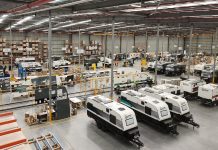
Australia must move fast in response to significant new incentives for sustainable manufacturing now available in the United States and many other industrial countries, or risk being shut out of rich new markets for manufactured items linked to renewable energy systems, a new report revealed.
The report, published by the Australia Institute’s Centre for Future Work, found that there is a rapid growth in the manufacture of batteries, electric cars, renewable energy generating and transmission equipment, and other renewable energy items.
This trend is being fueled by incentives provided by the Biden Administration’s Inflation Reduction Act, and similar supports in the EU, China, Japan, Korea, and Canada.
According to the report, Australia is deliberating its response, although it has not yet made a clear announcement of its plan.
In order to meet US benchmarks in the Australian context, the report calculated that a proportionate investment of between $83 and $138 billion over 10 years will be needed.
The report also catalogued several qualitative best practises that should be incorporated into Australia’s response to the IRA in order to have the greatest economic, social, and environmental impact.
These include strong labour and environmental standards tied to subsidised projects, public equity participation, and concurrent investments in training for workers to fill the new jobs.
“The extraordinary response by industry to the US measures confirms that these policies are having an outsized effect on the volume and location of sustainable manufacturing investment,” said Dr Jim Stanford, director of the Centre for Future Work and co-author of the report.
Dr Stanford underscored that Australia must respond swiftly to this new industrial environment or risk missing the opportunity to use its renewable energy resources to fuel long-term, diverse industrial growth.
Charlie Joyce, a research fellow at the Centre and co-author of the report, noted the race to manufacture clean technologies is well underway globally, and Australia is only just getting started.
“Australia has many advantages when compared to other competitors in this market, including an unmatched endowment of renewable energy sources and ample deposits of critical minerals,” Joyce stated.
The research fellow further argued, “If we don’t support domestic manufacturing to quickly enhance its production, skills, and technological capabilities, all that will happen is we will replace one set of unprocessed minerals: coal, oil and gas; with another: raw lithium and related critical minerals.”
Without action, Joyce said Australia would miss out on the majority of the renewable energy revolution’s side benefits for industry, technology, value-added, and diversity.
The report was presented at the 4th National Manufacturing Summit, which was co-sponsored by Weld Australia, the Centre for Future Work, and a number of business organisations.




















